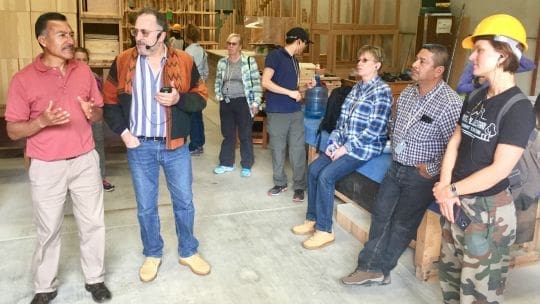

Mexico’s forests laws mean that 80% of its forests are owned by communities; the country has more than 3,000 community forests in total. Why Mexico is backing community forestry – and how community groups are ‘Scaling up locally controlled forest enterprises’ – were the topic and title of a workshop in the southern state of Oaxaca from 27-29 August, 2018.
Under the watchful eye of Monte Alban, from where the ancient Zapotecs once ruled, experts from 17 countries agreed to form a coalition that builds support for locally-controlled forest enterprises and increases collaboration between support agencies.
The coalition is led by the Rainforest Alliance (RA), Rights and Resources Initiative (RRI) and IIED – together with its co-management partners of the Forest and Farm Facility (FFF).
But what’s the big deal? Why all the interest in community enterprises? The answer was clear during a field visit to a cluster of forest enterprises owned by local communities in the largely Zapotec municipality of Ixtlán de Juárez in the mountainous Sierra Norte of Oaxaca.
Budding businesses
Of 283 community forest areas in Oaxaca, 85 have established locally controlled forest enterprises. Ixtlán de Juárez boasts probably the most advanced enterprise cluster – involving several businesses that have budded off from the Communal Unit for Forestry, Agriculture and Services (UCFAS) enterprise (PDF), established in 1988.
Separate enterprise units now manage an industrial scale pine nursery, 19,000 hectares of productive forest landscape and, since 2005, an automated sawmill, timber drying kilns, furniture factory, furniture retail outlets, eco-tourism businesses and a women’s wooden toy company.


For more detail, UCFAS is profiled in a compendium of successful locally controlled forest business models (‘Democratising forest business’). This is one of a number of learning resources compiled by the Forest Connect alliance and FFF to help practitioners adapt relevant lessons to their own context and scale up local business models.
Adding value
But the interest is not only in that UCFAS reduces poverty by distributing profits (albeit supported by some very favourable government procurement deals), nor that its sustainable production, certified by the Forest Stewardship Council (FSC), is helping mitigate climate change – although both are important points. Rather, it is that UCFAS, like many other locally controlled forest businesses, is doing something more ambitious.
Its local community owners, living with the consequences of their business decisions in their livelihoods and landscapes, are making careful trade-offs between multiple things that their members value. They are using a community business to pursue a balance of development needs or prosperity.
The women’s wooden toy enterprise, Capulin, is a case in point. It’s not only profitable but also enhances: environmental sustainability (such as by using waste wood rather than felled trees); gender empowerment (improving women’s income); social cohesion (distributing profits through community projects); livelihood security (diversifying product lines); human capacity (through business and design trainings); and cultural integrity (weaving Zapotec mythology into wooden toys).
Innovating towards prosperity
Globally, what people value is summarised in the rather unwieldy Sustainable Development Goals (SDGs). But recent research led by IIED under the title ‘Innovations towards prosperity’ (in press in the World Development journal) advances a somewhat simpler framing of prosperity – three clusters and six different categories of value including:
- Values based on familiarity: (i) sustained environmental and cultural heritage, and (ii) material wealth and health
- Values based on common interest: (iii) affirmative social relationships, and (iv) personal and collective security, and
- Values based on passion: (v) personal and reproductive fulfilment, and (vi) cognitive identity and purpose.
The research (full text) analyses innovations towards prosperity found in 50 locally controlled forest business models. It highlights how these differ from more conventional models of business in their activities and impacts.


Innovations by those business models in each of the six value categories that make up prosperity include: democratic oversight bodies governing environmental and cultural stewardship, negotiated benefit distribution and financial vigilance mechanisms, networks for better access to markets and decision-making, processes for conflict resolution and justice, processes of entrepreneurial training and empowerment for both men and women, and branding that reinforces local visions of prosperity.
To put it another way – while conventional business models deliver some elements of prosperity for a limited subset of the community, locally controlled forest businesses are trying to deliver all elements of prosperity for the whole community – ‘the whole enchilada’ so to speak.
Given that enterprises such as UCFAS could be incubated in almost all forest landscapes, they could play an important role in delivering the SDGs (including climate change action). The FFF has recently launched Phase II to help them do just that. And the coalition formed in Oaxaca to scale up locally controlled forest enterprises globally deserves your attention and support.
This blog post was originally published on iied.org and is reproduced here with permission.

About the author: Duncan Macqueen is principal researcher in the Natural Resources research group of the International Institute for Environment and Development (IIED).
Interested in receiving notifications about new blog posts? Subscribe to the RRI blog now to get new posts delivered right to your inbox.
